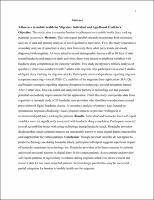Please use this identifier to cite or link to this item:
https://hdl.handle.net/20.500.12202/9048| Title: | Adherence to mobile health for migraine: Individual and app-based predictors |
| Authors: | Seng, Elizabeth Damush, Teresa Metts, Christopher Swencionis, Charles Weinberger, Andrea Snyder, Ivy |
| Keywords: | Psychology Clinical psychology Design Headache Health psychology Migraine Mobile health Technology Usability |
| Issue Date: | 27-Jun-2023 |
| Publisher: | Yeshiva University |
| Citation: | Snyder, I. (2023, June 27). Adherence to mobile health for migraine: Individual and app-based predictors (Publication No. 30566865) [Doctoral dissertation, Yeshiva University]. PDTG |
| Series/Report no.: | Ferkauf Doctoral Dissertations;Publication No. 30566865 |
| Abstract: | Abstract ¶Objective: This study aims to examine barriers to adherence to a mobile health diary tracking migraine occurrence. Methods: This convergent parallel research incorporates both secondary analysis of data and primary analysis of novel qualitative interviews. First, this study represents a secondary analysis of quantitative diary data from sixty-three adult participants previously diagnosed with migraine. All were asked to record demographic data as well as 30 days of data around headache and impact on daily activities; these were treated as predictor variables with headache diary completion as the outcome variable. This study incorporates primary analysis of qualitative interviews conducted with 7 adults with migraine who participated in research studies of digital diary tracking for migraine attacks. Participants answered questions regarding migraine symptoms impacting vision (UPSIS-12), usability of the migraine diary application (MAUQ), and broader strategies regarding migraine disruption in technology use and mitigation thereof. After 5 interviews, data was coded and analyzed for barriers to technology use and pursuant potential accessibility improvements for the application. Third, this study incorporates data from a qualitative research study of 20 headache care providers who identified considerations around prescription of digital headache diaries. A secondary analysis of primary data focused on spontaneous responses disclosing visual symptom impacts on provider willingness to recommend digital diary tracking for patients. ¶Results: Individual and headache-level self-report variables were not significantly associated with headache diary completion. Participants reported several accessibility issues with using technology during headache attack. Headache providers disclosed that visual symptom impacts are anecdotally known to make digital diaries inaccessible and inappropriate for certain patients. ¶Conclusion: Though personal variables do not appear to predict technology use during headache attack, participant self-report suggests significant impact of headache symptoms on technology use. Headache providers echo these concerns by patients and reveal anecdotal patterns in digital diary fit for certain patients. Across patient and provider self-report, patterns of digital diary avoidance during migraine attack risk biased clinical and research data for our most-impacted patients. Several design possibilities may be successful partial mitigation for barriers to mobile health use for migraine. |
| Description: | Doctoral dissertation, PhD / Open Access |
| URI: | https://hdl.handle.net/20.500.12202/9048 |
| Appears in Collections: | Ferkauf Graduate School of Psychology: Doctoral Dissertations |
Files in This Item:
| File | Description | Size | Format | |
|---|---|---|---|---|
| Ivy Snyder-Dissertation-Defense316-submission-formatted 2023.pdf | 485.8 kB | Adobe PDF |  View/Open |
This item is licensed under a Creative Commons License

